Kakula’s northern and southern access drives to connect next month, allowing highly-productive stoping operations to begin in centre of orebody in +8% copper
Excellent construction progress being made on Kakula’s concentrator plant; first production now expected in July 2021
KOLWEZI, DEMOCRATIC REPUBLIC OF CONGO – Robert Friedland and Yufeng “Miles” Sun, Co-Chairmen of Ivanhoe Mines (TSX: IVN; OTCQX: IVPAF), announced today thatexcellent progress is being made advancing underground mine development at the Kakula Mine in the Democratic Republic of Congo (DRC), with current mining grades of up to 11% copper in one of the access drives being advanced from the northern decline.
Kakula’s northern and southern dual access drives are expected to be connected (the mining term is “holing”) next month, allowing highly-productive mining (stoping) operations to begin in high-grade zones. Approximately 260 metres of tunneling remains until the access drives are connected (see figures 1 and 2).
“Development of the dual access drives from Kakula’s northern decline has entered a zone of chalcocite-rich ore grading up to 11% copper over a height of 6.6 metres,” said Mr. Friedland. “These copper grades are extraordinary in a global context, but are not unexpected. They are real-time confirmation of the exceptional quality of the Kakula resource, which sits at the apex of any ranking worldwide.”
In addition, access drift 1 from Kakula’s southern decline has moved from the medium-grade ore zone (+5 copper) into the high-grade ore zone, and currently is traversing the +8% copper zone as it approaches the “holing” position in the centre of the deposit. Access drift 2 from Kakula’s southern decline currently is traversing the +5% copper zone and is expected to quickly enter the +8% copper zone (see figures 1 and 2).
“We are looking forward to achieving our first “holing” between the northern and southern declines,” said Mr. Friedland. “It will open up important high-grade copper reserves, and enable ventilation to flow through dedicated underground airways, which have been developed between Kakula’s northern and southern declines. This marriage between Kakula’s northern and southern declines will facilitate the ramp up in production and dramatically increase the efficiency of our underground logistics, and further improve safety.”
Figure 1: Underground development completed to October 18, 2020 (in black) and scheduled development (green, brown, purple) to November 30, 2020. Also shown are the +3%, +5% and +8% copper contours and the location where the northern and southern access drives are scheduled to join in November (red circle).
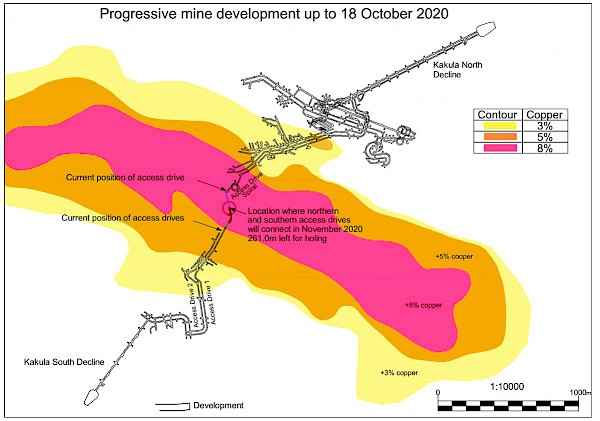
Figure 2: Kakula’s underground development completed to October 18, 2020 (in red). The black star shows where the northern and southern access drives are scheduled to join in November.
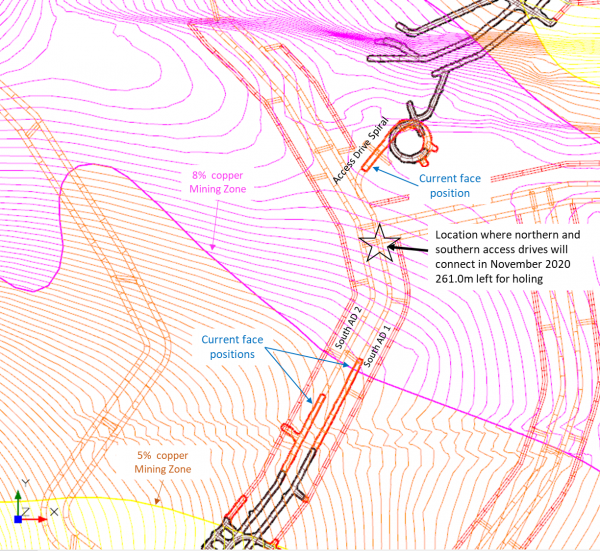
A Niton (portable XRF) reading on the tip of a chalcocite-rich piece of ore grading 67.8% copper from Kakula’s northern access drive spiral. Grey-colored chalcocite has the greatest percentage of copper of all the common sulphide-copper-bearing minerals ─ almost 80% copper by weight.
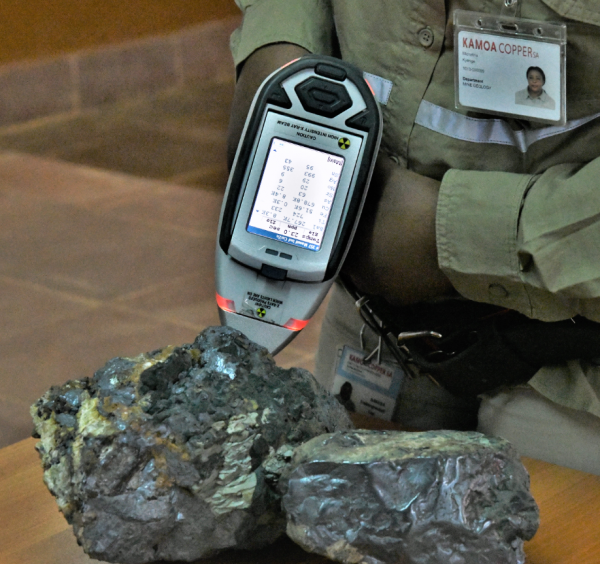
Mine geologist Micheline Kyenge examines the chalcocite-rich face in Kakula’s northern access drive spiral. The prevalence of the grey-coloured chalcocite accounts for the ultra-high-copper grades recently encountered.
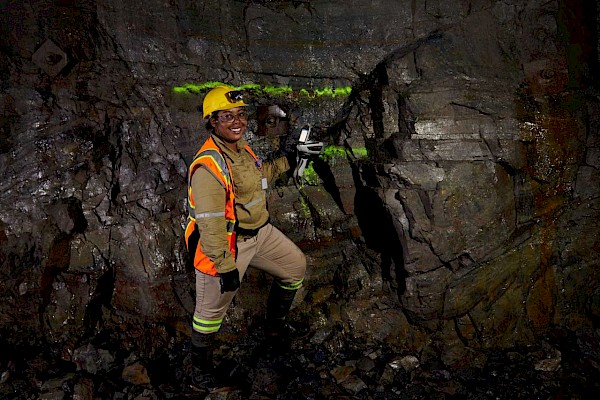
Excellent construction progress being made on Kakula’s concentrator plant; first production now expected in July 2021, at the beginning of Q3 2021 guidance
Steve Amos, Kamoa Copper’s Head of Projects, stated: “The updated project schedule for the initial 3.8 million-tonne-per-annum (Mtpa) concentrator plant indicates that first ore now is expected at the beginning of our Q3 2021 planned window. There has been an enormous effort by the project and construction teams to not only maintain the milestone dates with the challenges presented by the pandemic, but to place ourselves in a position to commission early. We are delighted with the progress made to date.”
“It will be enormously beneficial if we can commission early,” said Rochelle De Villiers, Kamoa Copper’s Co-CFO. “We look forward to generating revenue as early as possible, which will allow us to advance the project’s Phase 2 development with internal cash flow. The long-lead items for the second 3.8 Mtpa concentrator plant have been ordered and the second phase of our development now is officially underway.”
Mark Farren, CEO of Kamoa Copper said: “We will leverage what we have learned thus far into Phase 2 construction, and expand the project at a sustainable rate that minimizes peak funding. Phases 1 and 2 combined are expected to produce approximately 400,000 tonnes of copper per year.”
“Our engineers are already planning the steps necessary to implement phases 3, 4 and 5, which would expand the project’s production rate to at least 19 million tonnes of ore a year.”
“We currently have more than 6,000 people on site, most of whom are employed by sub-contractors for the construction of the mining infrastructure and concentrator. This will transition gradually as we move into production. We expect to employ close to 2,000 permanent Kamoa Copper employees once both concentrator plants are operating and the first two mines are producing at a steady state of 7.6 million tonnes of ore a year.”
“We have a talented, young Congolese workforce who are eager to learn and grow as we develop this mine into a world-class operation. The once-in-a-century metamorphosis from a giant, greenfields discovery into a successful world-leading mining operation is inherently challenging; however, our people have the special blend of experience and commitment to do it successfully,” Mr. Farren added.
The two, 7-megawatt ball mills at Kakula’s initial 3.8 Mtpa processing plant, with the girth gears now installed. A 3D illustration of the finished ball mills (shown in green) is below, with the next two ball mills for the recently-initiated second processing plant shown in magenta.
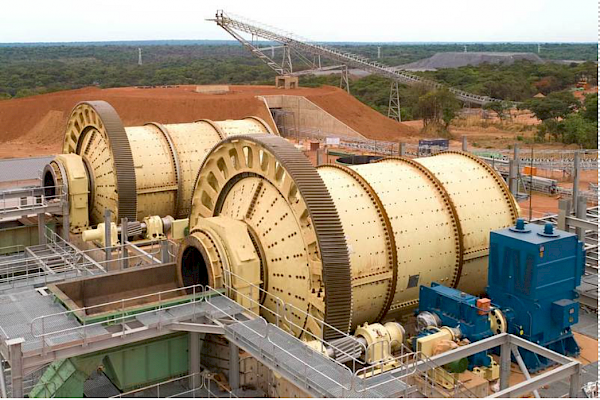
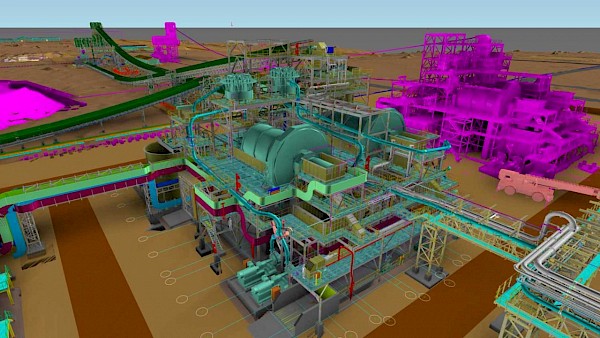
Ongoing construction of Kakula’s initial 3.8 Mtpa processing plant, showing the assembled ball mills and the first four flotation tanks.
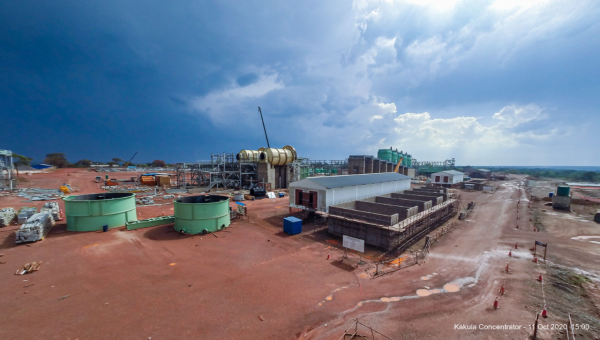
Kapenda Mutombo pours concrete at Kakula’s copper concentrate storage area.
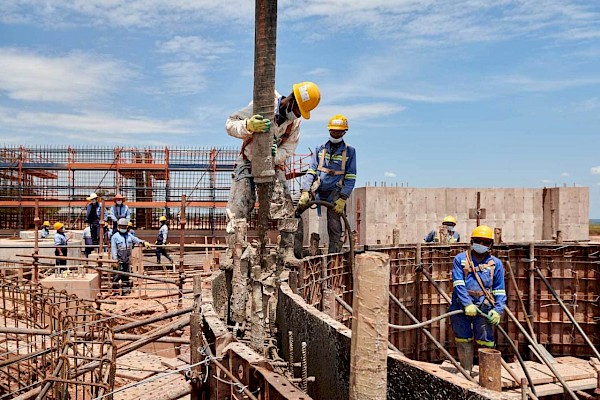
Deli Mamadou installing Kakula’s tailings pipeline. Approximately one half of the mine’s tailings will be sent back underground to fill mined-out voids, significantly reducing the surface tailings storage.
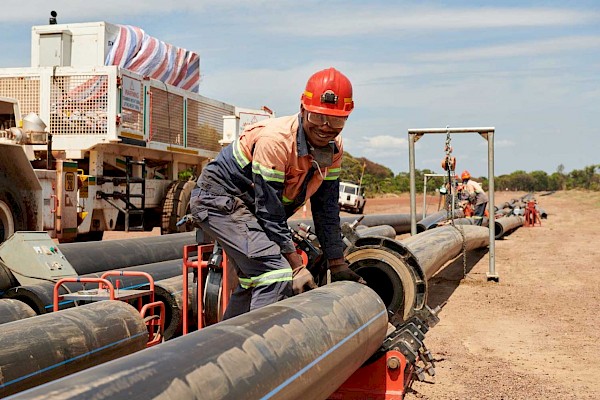
Yannick Kankenke (left) and Tresor Mukadi (right) servicing an Epiroc double boom drill rig at the Kakula workshop.
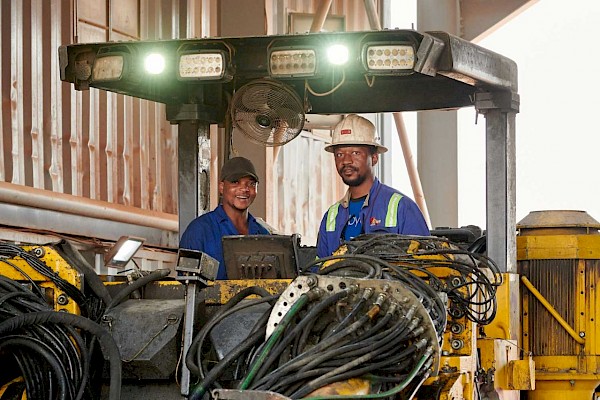
Kamoa-Kakula expected to be connected to the national power grid in December, providing the project with clean, renewable 220-kV hydropower
Ben Munanga, General Manager of Ivanhoe Mines Energy and a senior member of the executive management team at Kamoa Copper, stated: “We have made excellent progress upgrading the Mwadingusha hydroelectric power station and at the new Western Dispatch substation in Kolwezi. In December, we expect to tie in the 30-kilometre, 220-kilovolt (kV) power line connecting this substation to Kamoa-Kakula, and supply the mine with reliable and clean hydro-generated electricity from the national grid.”
The upgrading work at the 72-megawatt Mwadingusha hydropower plant is nearing completion and electricity from all of Mwadingusha’s six turbines is expected to be integrated into the national power grid in the first quarter of 2021. The work is being conducted by engineering firm Stucky, of Lausanne, Switzerland, under the direction of Ivanhoe Mines and its joint-venture partner, Zijin Mining Group, in conjunction with the DRC’s state-owned power company, La Société Nationale d’Electricité (SNEL).
“A long-term, sustainable supply of electricity is essential to Ivanhoe’s vision to develop Kamoa-Kakula in an environmentally and socially responsible manner,” said Mr. Friedland. “Hydropower is the cleanest energy solution for Kamoa-Kakula and will ensure the project will be among the world’s lowest greenhouse gas emitters per unit of copper produced.”
Mr. Friedland also said that a recent, independent audit of Kamoa-Kakula’s greenhouse gas intensity metrics performed by Hatch Ltd., of Mississauga, Canada, a leading, international environmental consulting firm, confirmed that Kamoa-Kakula will be among the world’s lowest greenhouse gas emitters per unit of copper produced, validating the project’s commitment to be a leader in environmentally-responsible copper mining. In addition, approximately one half of the mine’s tailings will be mixed with cement and pumped back underground to fill mined-out voids, resulting in a surface tailings containment facility that is tiny compared to other major mines.
Tresor Kalenga Musoya (top), Liang Yang (middle) and Chanzhong Yang (bottom) installing the 220-kV power line that will transport clean, renewable hydropower from the DRC national grid to the Kamoa-Kakula Project.
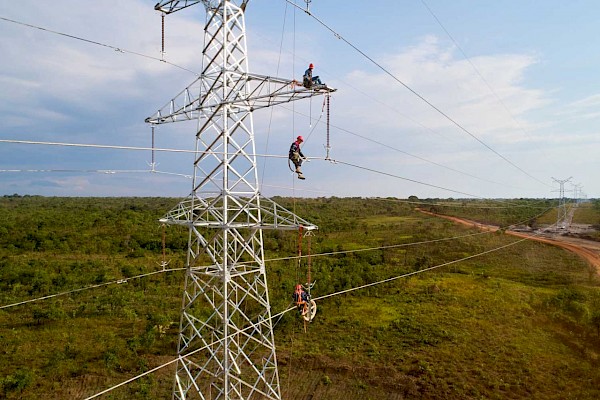
Contract workers from Andritz Hydro of Vevey, Switzerland, upgrading the penstocks and emergency intake valves at theMwadingusha hydropower plant.
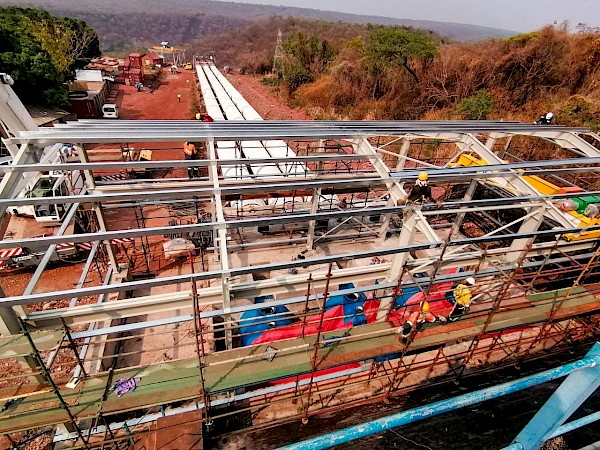
Kamoa-Kakula’s October monthly mine progress update to be issued in early November
Ivanhoe plans to issue its regular Kamoa-Kakula monthly mine progress update for the month of October in early November, which will provide details on the project’s underground development advancement, tonnage and grade of the project’s pre-production ore stockpiles, and construction progress of the initial 3.8 Mtpa concentrator plant and associated infrastructure.
Qualified Persons
Disclosures of a scientific or technical nature regarding development at the Kamoa-Kakula Project in this news release have been reviewed and approved by Steve Amos, who is considered, by virtue of his education, experience and professional association, a Qualified Person under the terms of National Instrument 43-101 (NI 43-101). Mr. Amos is not considered independent under NI 43-101 as he is Kamoa Copper’s Head of Projects.. Mr. Amos has verified the technical data disclosed in this news release.
Other disclosures of a scientific or technical nature in this news release have been reviewed and approved by Stephen Torr, who is considered, by virtue of his education, experience and professional association, a Qualified Person under the terms of NI 43-101. Mr. Torr is not considered independent under NI 43-101 as he is the Vice President, Project Geology and Evaluation of Ivanhoe Mines. Mr. Torr has verified the other technical data disclosed in this news release.
The development grade estimates contained in this release are based upon channel sampling from underground headings. Sampling is done on one-metre increments across a full vertical profile approximately every 15 metres, with six to seven 150-gram samples taken. The samples are pulverized at the project’s onsite laboratory and analyzed used using a portable XRF (pXRF) instrument. Kamoa Copper has routinely analyzed its exploration drill core for copper using pXRF, in addition to analysis at a commercial laboratory using four acid digest and ICP-OES. This data has demonstrated that pXRF results can be relied upon for grade control and run-of-mine sampling.
Ivanhoe has prepared an independent, NI 43-101-compliant technical report for the Kamoa-Kakula Project, which is available on the company’s website and under the company’s SEDAR profile at www.sedar.com:
- The Kamoa-Kakula 2020 Resource Update dated March 25, 2020, prepared by OreWin Pty Ltd., Wood plc, DRA Global, SRK Consulting (South Africa) (Pty) Ltd and Stantec Consulting International LLC.
The technical report includes relevant information regarding the assumptions, parameters and methods of the mineral resource estimates on the Kamoa-Kakula Project cited in this news release, as well as information regarding data verification, exploration procedures and other matters relevant to the scientific and technical disclosure contained in this news release.
As announced in Ivanhoe Mines’ September 8, 2020, news release, an updated independent, NI 43-101-compliant technical report for the Kamoa-Kakula Project is being prepared and will be issued later this month.
Information contacts
Investors: Bill Trenaman +1.604.331.9834 / Media: Matthew Keevil +1.604.558.1034
Forward-looking statements
Certain statements in this release constitute “forward-looking statements” or “forward-looking information” within the meaning of applicable securities laws. Such statements and information involve known and unknown risks, uncertainties and other factors that may cause the actual results, performance or achievements of the company, its projects, or industry results, to be materially different from any future results, performance or achievements expressed or implied by such forward-looking statements or information. Such statements can be identified by the use of words such as “may”, “would”, “could”, “will”, “intend”, “expect”, “believe”, “plan”, “anticipate”, “estimate”, “scheduled”, “forecast”, “predict” and other similar terminology, or state that certain actions, events or results “may”, “could”, “would”, “might” or “will” be taken, occur or be achieved. These statements reflect the company’s current expectations regarding future events, performance and results and speak only as of the date of this release.
Such statements include without limitation, the timing and results of: (i) statements regarding the northern and southern access drives at Kakula are expected to be joined in November 2020; (ii) statements regarding first production at the Kakula Mine is scheduled for July 2021; (iii) statements regarding the Kakula Mine will be powered by clean, renewable hydroelectricity and be among the world’s lowest greenhouse gas emitters per unit of copper produced; (iv) statements regarding Kakula will have a relatively tiny surface footprint as approximately one half of the mine’s tailings will be pumped back into underground workings; (v) statements regarding the Kakula Mine is scheduled to be connected to the national grid with 220 kV hydro-generated power in December 2020; and (vi) statements regarding the implementation of Kamoa-Kakula phases 3, 4 and 5, would expand the project’s production rate to at least 19 million tonnes of ore a year; and (vii) statements regarding the Kamoa-Kakula monthly mine progress update is expected in early November
As well, all of the results of the pre-feasibility study for the Kakula copper mine and the updated and expanded Kamoa-Kakula Project preliminary economic assessment constitute forward-looking statements or information, and include future estimates of internal rates of return, net present value, future production, estimates of cash cost, proposed mining plans and methods, mine life estimates, cash flow forecasts, metal recoveries, estimates of capital and operating costs and the size and timing of phased development of the projects. Furthermore, with respect to this specific forward-looking information concerning the development of the Kamoa-Kakula Project, the company has based its assumptions and analysis on certain factors that are inherently uncertain. Uncertainties include: (i) the adequacy of infrastructure; (ii) geological characteristics; (iii) metallurgical characteristics of the mineralization; (iv) the ability to develop adequate processing capacity; (v) the price of copper; (vi) the availability of equipment and facilities necessary to complete development; (vii) the cost of consumables and mining and processing equipment; (viii) unforeseen technological and engineering problems; (ix) accidents or acts of sabotage or terrorism; (x) currency fluctuations; (xi) changes in regulations; (xii) the compliance by joint venture partners with terms of agreements; (xiii) the availability and productivity of skilled labour; (xiv) the regulation of the mining industry by various governmental agencies; (xv) the ability to raise sufficient capital to develop such projects; (xiv) changes in project scope or design; and (xv) political factors.
Forward-looking statements and information involve significant risks and uncertainties, should not be read as guarantees of future performance or results and will not necessarily be accurate indicators of whether or not such results will be achieved. A number of factors could cause actual results to differ materially from the results discussed in the forward-looking statements or information, including, but not limited to, the factors discussed below and under “Risk Factors”, and elsewhere in this release, as well as unexpected changes in laws, rules or regulations, or their enforcement by applicable authorities; the failure of parties to contracts with the company to perform as agreed; social or labour unrest; changes in commodity prices; and the failure of exploration programs or studies to deliver anticipated results or results that would justify and support continued exploration, studies, development or operations.
Although the forward-looking statements contained in this release are based upon what management of the company believes are reasonable assumptions, the company cannot assure investors that actual results will be consistent with these forward-looking statements. These forward-looking statements are made as of the date of this release and are expressly qualified in their entirety by this cautionary statement. Subject to applicable securities laws, the company does not assume any obligation to update or revise the forward-looking statements contained herein to reflect events or circumstances occurring after the date of this release.
The company’s actual results could differ materially from those anticipated in these forward-looking statements as a result of the factors set forth below in the “Risk Factors” section in the company’s Q2 2020 MD&A and its current annual information form.


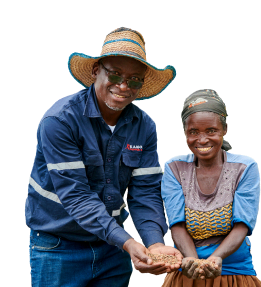
 English
English Français
Français 日本語
日本語 中文
中文